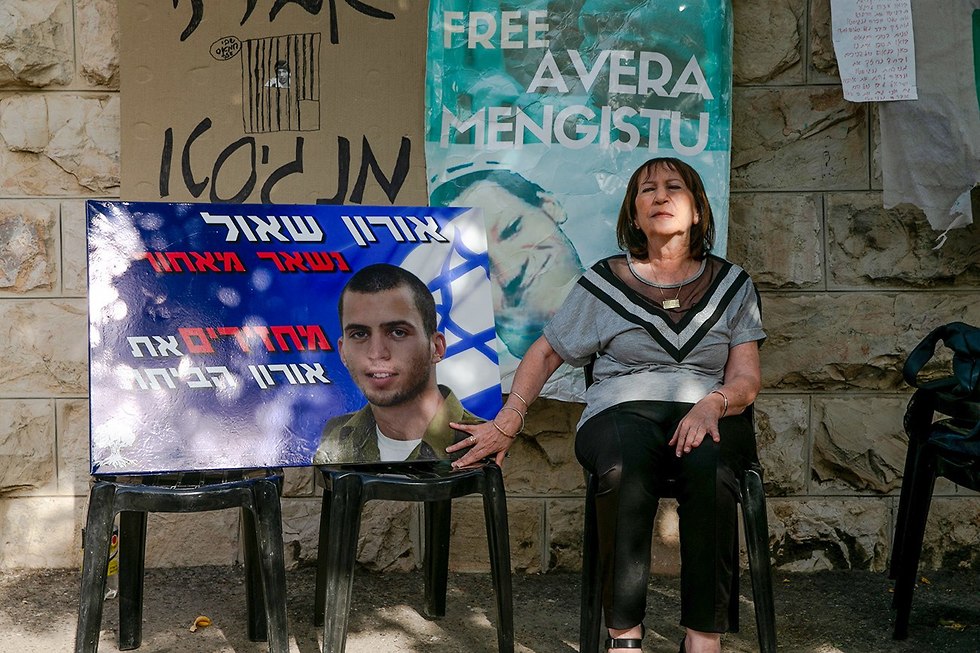
On social media, there are no gag orders
Identifying details of IDF Lt. Col. M., who was killed during a mission in Gaza, quickly spread through social media despite the media blackout; while security officials condemn what they view as a despicable phenomenon, social media experts say it's a lost battle for those trying to conceal information in this day and age.
While IAF fighter jets and helicopters were still flying over Gaza, and sounds of explosions shook the air, many social media users had already been informed about the details of the battle. Similarl to past events, it began with a rumor about a kidnapped soldier, prompting the IDF Spokesperson’s Unit to issue a response to calm the situation, but in the early hours of the morning the rumors about an abducted soldier were replaced by personal details of the fallen Lieutenant Colonel M. The pictures of his family, his children, and his wife spread on social media like wildfire.
Even MKs Shelly Yachimovich and Ksenia Svetlova published the details identifying the soldier on their respective Facebook pages, despite the censor's instructions.
"That's how it is in our era," experts say. "You can’t stop it and you can’t act surprised that sensitive information is available to all. We must understand that times have changed and this is the reality, you just have to figure out how to deal with it."
"There is a problem here, which is expressed through our voyeuristic urges," says Etgar Shpivak, CEO of Fixel, a company that specializes in the digital field. "It’s a problem that attests to our lack of responsibility as a society. Many times we do not know whether information is true or false, and because of that voyeuristic nature we feel that we are the bearers of the news, we are the innovators. It can be either a cool commercial that’s fun to share or sensitive information about soldiers who died in battle. In recent years, there’s far more information being spread through WhatsApp or Telegram than through Facebook,” he explained.
“On Facebook, psychologically, there’s a feeling of being exposed, whereas WhatsApp feels more intimate because you’re only sharing the information with a few friends. People don’t think about the fact that a simple message they forward is going to make its way to hundreds of chat groups. It happens at a crazy pace," Shpivak stressed.
When asked about the difference between voyeurism, celebrity and security incidents, Shpivak says the urges that push us to share sensitive information is a broad phenomenon.
"The psychology is the same. Just like we forward a video of a celebrity in a bathing suit, we pass on information about a soldier who was wounded in battle. Our attitude is the same. The more intimate chat groups are created, the more problematic it becomes. However, the problem is not Facebook but something much broader. It’s a societal problem, and not only in Israel, but worldwide. The mindset of the social media generation is—first share, then think. We need to educate them in order to raise awareness about social responsibility,” he explained.
A generation of voyeurs
The IDF Censor has not yet surrendered to the forces of time and technology. This unacceptable phenomenon raises its head time after time, and as of right now, there is no one who can stop it. Nevertheless, the Censor does not intend to change the instructions. The incident in Gaza on Sunday was not the first time it happened. Bereaved families say they were informed of their sons deaths in military operations after reading anonymous WhatsApp messages on many occasions. Other parents said they had a breakdown after seeing their child's name accidentally appear on a list of casualties spread through social networks.
This difficult and irresponsible phenomenon has reached its peak during Operation Protective Edge, when several Golani troops were killed after they’d been ambushed and an RPG was fired at their APC. The list of the alleged dead was once again shared by many on WhatsApp, one of the names was Oron Shaul—whose body is still being held by Hamas in Gaza. Aviram Shaul, Oron’s brother, also received that message when he himself was on his way to Gaza.
"I stopped breathing for a few moments, and I said to myself: 'These are just words, these are just letters that make up the name Oron Shaul,'” Aviram said in an interview with Yedioth Ahronoth. ”There was a lot of disinformation between what we were told and what actually happened."
Maayn, the sister of Hadar Buchris—who was murdered in a terror attack at Gush Etzion junction—was also informed of her death via social networks. "It’s horrible. You're so confused, and without any official statements everything becomes one big mess," Maayan recalled. "I was shopping when I received a WhatsApp message about a terrorist attack in Gush Etzion, and Hadar's name came up. I was shaking, I started to scream, I lost my temper. I do not remember exactly what happened. I remember I called the MDA but they refused to give me any details.”
Hanan Cohen, founder of a website called "Irrelevant" that specializes in detection of social media, rumors said that on Sunday, as the events in Gaza began to unfold, Twitter was awash with posts about a kidnapped soldier. "The moment there is an incident involving IDF forces, the immediate hypothesis is that a soldier has been kidnapped," he stated.
"People want to know quickly, they are impatient. In addition, people do not always trust the officials who provide the information, that's why alternative channels of communication are created, but they’re not always trustworthy. So on one hand, they do not believe the official spokespeople, on the other hand, the information obtained through other channels isn’t always true,” Cohen added.
"More and more people are sharing the information because it wins them points as far as their social status in concerned, so they could become the opinion makers. They tell us something that, allegedly, only they seem to know, and thus make other people their partners in secret. From that moment on they become major sources of information for those with whom they share it.
“The messages I received on Twitter from the soldier’s friends could be characterized by deep sorrow on the one hand, and pride on the other. I didn’t get the sense they felt that the fact that his name had been revealed constitutes as a threat to national security,” he explained.
According to Cohen, the sharing of information is characteristic of the change in communication channels that have occured over the recent years. "It used to be email, today it’s WhatsApp, the information is dependent on a period of time we’re in. In times of security tension, there will be more messages related to security, depending on what the public is preoccupied with at that time. The people express their fears by spreading these rumors."
Cohen adds that in his opinion hiding information from the public, in this day and age, serves no purpose.
"The panic surrounding the spread of information is irrelevant in the age of social media. When people understand the essence of the secret, they keep it. However, if they don’t understand the importance of keeping something a secret—they will share it any way they can. If you ask people on the street why they should not know the name of the fallen soldier, they will not give you a determined answer like the IDF Censor, but ask you, 'Why not?'” Cohen concludes.
Noam Manella, a researcher of digital consciousness, agrees with the claim that people do not really understand why it’s wrong to share sensitive information on social media. "People make a distinction between the public sphere of Facebook and WhatsApp, which is perceived as more intimate," he stressed.
"They think that if they put up the information on WhatsApp, they didn’t actually reveal anything or committed an offense. The more it’s shared, the more they feel that there is no point in hiding it anymore, and want to tell their friends on Facebook, get points for networking. It rings true for politicians and for ordinary people—in disseminating information, everyone feels connected,” he emphasized.














